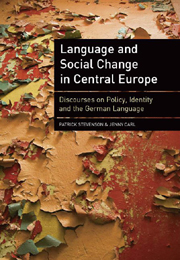Book contents
- Frontmatter
- Contents
- Acknowledgements
- List of Tables
- Transcription Conventions
- Map of Central Europe
- 1 Introduction
- 2 Discourses on Language in Social Life: Theoretical and Methodological Orientations
- 3 Sociolinguistic Histories and the Footprint of German in Eastern Central Europe
- 4 Language Policy Discourses: Interventions and Intersections
- 5 Language (Auto)biographies: Narrating Multilingual Selves
- 6 Language Ideologies: Negotiating Linguistic Identities
- 7 Conclusions
- Appendix A European Institutions and Documents Concerning Language Policy
- Appendix B Preamble to the European Charter for Regional or Minority Languages
- Appendix C Introduction to the 2005 Commission Communication ‘A New Framework Strategy for Multilingualism’
- Appendix D Introduction to the 2008 Commission Communication ‘Multilingualism: an asset for Europe and a shared commitment’
- Appendix E German and Austrian agents and institutions in foreign cultural policy
- Appendix F Extract from ‘Auswärtige Kulturpolitik – Konzeption 2000’
- Appendix G Central focus – ‘Leitbild’ – of the Goethe-Institut
- Appendix H Austria's Auslandskulturkonzept NEU
- Appendix I Plattform Kultur Mitteleuropa – Platform Culture Central Europe
- Appendix J Extract from Austria kulturint – Tätigkeitsbericht 2002
- Appendix K Czech 2001 White Paper on Education
- Appendix L Czech 2004 Education Act
- Appendix M Extract from Czech Follow-up of Action Plan on Language Learning and Linguistic Diversity
- Appendix N Hungarian 1997 Directive Concerning the Education for National and Ethnic Minorities
- Appendix O Extract from 2007 Hungarian National Core Curriculum
- Appendix P Extract from Hungarian Follow-up of Action Plan for Language Learning and Linguistic Diversity
- References
- Index
Appendix A - European Institutions and Documents Concerning Language Policy
Published online by Cambridge University Press: 05 February 2013
- Frontmatter
- Contents
- Acknowledgements
- List of Tables
- Transcription Conventions
- Map of Central Europe
- 1 Introduction
- 2 Discourses on Language in Social Life: Theoretical and Methodological Orientations
- 3 Sociolinguistic Histories and the Footprint of German in Eastern Central Europe
- 4 Language Policy Discourses: Interventions and Intersections
- 5 Language (Auto)biographies: Narrating Multilingual Selves
- 6 Language Ideologies: Negotiating Linguistic Identities
- 7 Conclusions
- Appendix A European Institutions and Documents Concerning Language Policy
- Appendix B Preamble to the European Charter for Regional or Minority Languages
- Appendix C Introduction to the 2005 Commission Communication ‘A New Framework Strategy for Multilingualism’
- Appendix D Introduction to the 2008 Commission Communication ‘Multilingualism: an asset for Europe and a shared commitment’
- Appendix E German and Austrian agents and institutions in foreign cultural policy
- Appendix F Extract from ‘Auswärtige Kulturpolitik – Konzeption 2000’
- Appendix G Central focus – ‘Leitbild’ – of the Goethe-Institut
- Appendix H Austria's Auslandskulturkonzept NEU
- Appendix I Plattform Kultur Mitteleuropa – Platform Culture Central Europe
- Appendix J Extract from Austria kulturint – Tätigkeitsbericht 2002
- Appendix K Czech 2001 White Paper on Education
- Appendix L Czech 2004 Education Act
- Appendix M Extract from Czech Follow-up of Action Plan on Language Learning and Linguistic Diversity
- Appendix N Hungarian 1997 Directive Concerning the Education for National and Ethnic Minorities
- Appendix O Extract from 2007 Hungarian National Core Curriculum
- Appendix P Extract from Hungarian Follow-up of Action Plan for Language Learning and Linguistic Diversity
- References
- Index
Summary
In addition to the information provided in the discussion of primary documents in Chapter 4, we will provide some more basic details here about the functioning of and relations between the main European institutions involved in the area of language policy.
European Commission
In 2003 The European Commission devised an Action Plan for Promoting Language Learning and Linguistic Diversity spanning the period from 2004 till 2006, which was inspired by recommendations in the 2001 Resolution by the European Parliament concerning measures to promote linguistic diversity and language learning (see http://europarl.europa.eu/sides/getDoc.do?pubRef=-// EP//TEXT=TA+P5-TA-2001-0719+0+DOC+XML+VO//EN). These recommendations emerged from the successful 2001 European Year of Languages.
The Action Plan intends to set up strategies for extending opportunities to learn at least two foreign languages to all citizens, for improving quality of language teaching, and, ultimately, to create an environment that favours language learning. It includes supporting actions by local, regional and national authorities, while the main focus is on the European level to help endow as many citizens as possible with intercultural and language skills so that they can take advantage of the global market-place and so that EU policies can be pursued more effectively. The aim is to enable people to communicate effectively (reading, writing, listening, speaking in two foreign languages) and to create understanding of foreign cultures.
- Type
- Chapter
- Information
- Language and Social Change in Central EuropeDiscourses on Policy, Identity and the German Language, pp. 208 - 211Publisher: Edinburgh University PressPrint publication year: 2010



